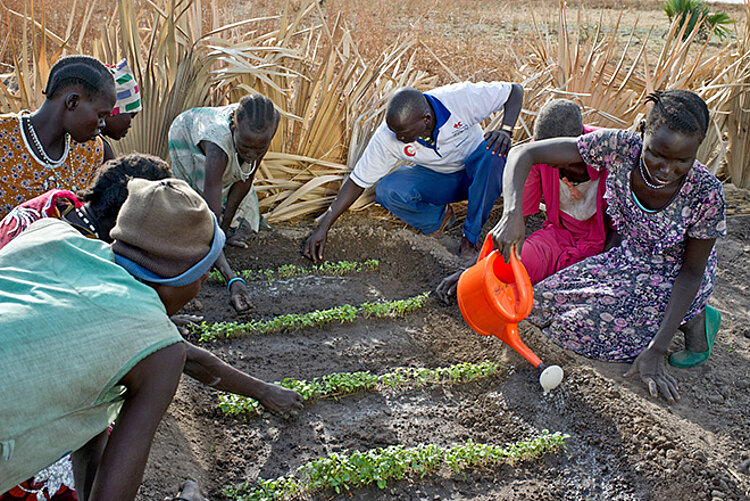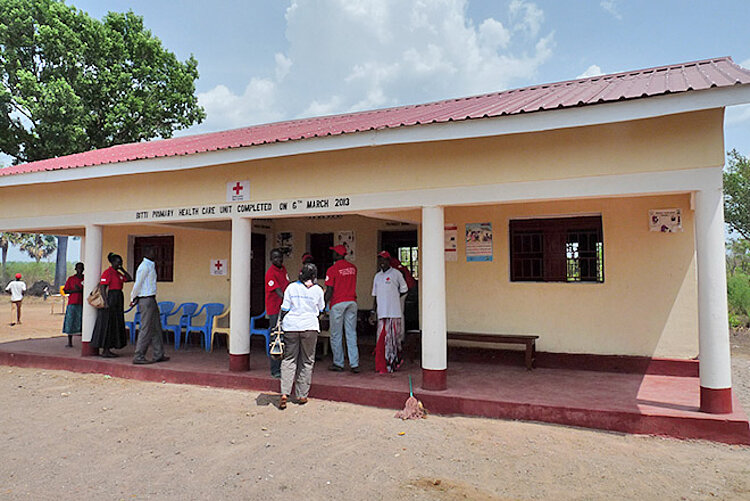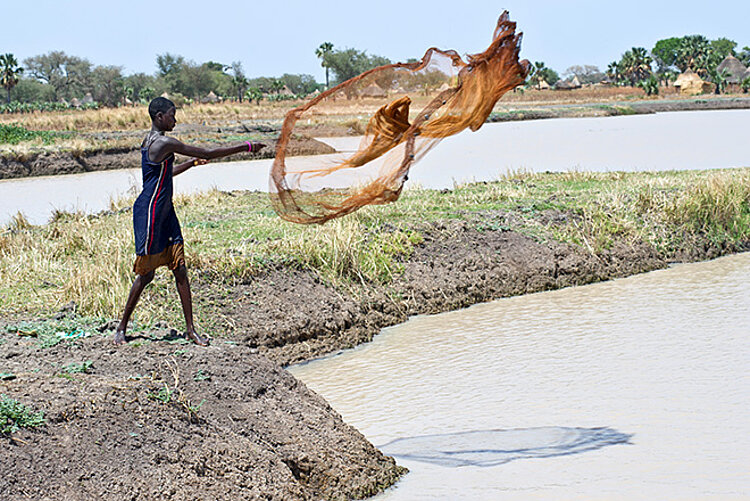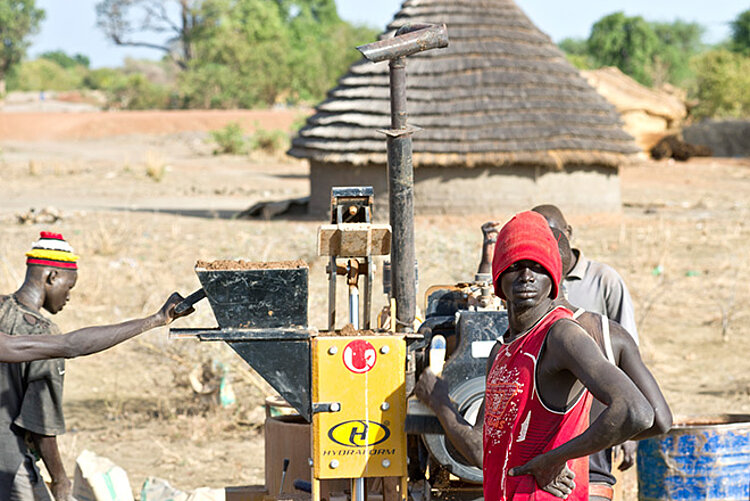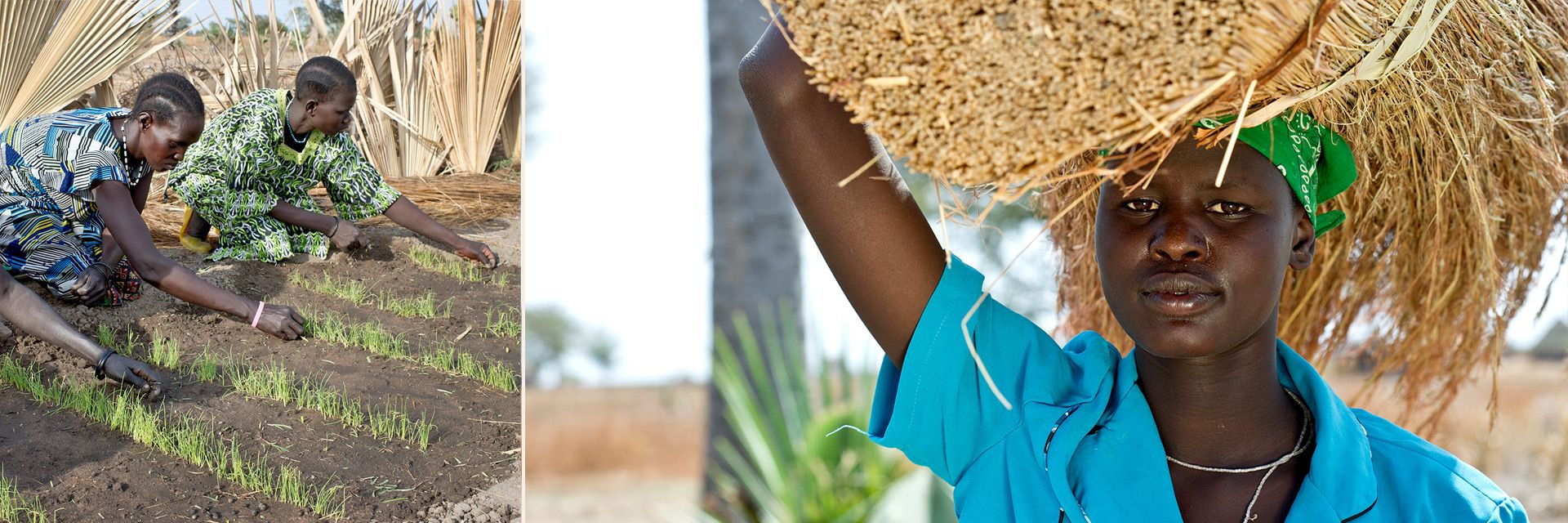
Creating livelihoods for women and young people
Poverty, lack of educational opportunities and conflict are daily challenges for people in the Western Equatoria region of South Sudan. GRC and the South Sudan Red Cross are working with a long-term, holistic approach to improve the prospects of women and young people in particular.
Poverty, food insecurity and lack of prospects
Western Equatoria is a rural state in the west of South Sudan. A large part of the population depends on agriculture for a living. However, yields from agriculture are meagre. Many families can neither grow enough food for their own needs nor secure their livelihoods through a regular income. The effects of climate change further exacerbate the food deficit. Rising prices, high inflation and a nationwide food shortage mean that many families cannot afford to buy enough food. At the same time, access to other sources of income is extremely limited. Most young people - 70 per cent of the population is under 30 years old - have little prospect of receiving recognised vocational training.
Discrimination against women
Particularly during or after armed conflicts, women encounter additional dangers: they experience sexualised violence and are exposed to health risks such as prenatal complications. In South Sudan, they are most affected by malnutrition and generally have fewer opportunities for a good education.
Aid measures
Together with the South Sudan Red Cross, we support the communities and their individual members with various activities so that they can increase their productivity and self-reliance in the long term.
Improving food security
The yields of most smallholder farmers in Western Equatoria are low. Changing climatic conditions reduce the fertility of the soil, and much knowledge about agriculture has been lost due to the ongoing conflicts in the country. The South Sudan Red Cross, in collaboration with GRC, is addressing the resulting food insecurity with short- and long-term approaches, which include:
- distributing seeds, tools and agricultural equipment
- agricultural training for farmers who then share their new-found knowledge with their communities
- involving young people in testing new cultivation methods in field schools or vegetable gardens for women.
Training and income diversification
The vast majority of young South Sudanese in Western Equatoria have little access to education. A central point of our work on the ground therefore is to create better prospects for the future by offering vocational training, teaching market-relevant skills to enable young people to gain a foothold in the world of work beyond agriculture. In cooperation with the South Sudanese Red Cross, we invest in activities to improve the economic situation of families and communities in the medium term, to strengthen their resilience and also to improve food security. This also reduces existing potential for conflict which, due to a lack of resources, are still often part of everyday life. The activities include:
- Renovating and equiping training centres. The modernisation and construction projects are carried out by local suppliers and companies, which strengthens the local economy.
- Training courses in various fields, e.g. mechanics, carpentry, tailoring, hairdressing. All specialisations were selected following discussions with the communities and are geared to the needs and interests of the participants. In addition, the centres are well located locally and offer good connections to the surrounding labour market.
- Offering training courses for entrepreneurship, accounting and marketing to help trained community members when setting up small businesses.
- Start-up support in the form of financial aid and/or equipment (e.g. sewing machines, toolboxes, fabrics, hand tools, etc).
Strengthening the resilience of women
Promoting social cohesion
A large part of the South Sudanese population has experienced years of war. Many people suffer from post-traumatic stress disorders. Fighting due to ethnicity, lack of resources or as a result of refugee movements is part of everyday life. In collaboration with the South Sudanese Red Cross, we invest in activities that bring communities together and strengthen peaceful coexistence, such as:
- Training on mediation and conflict resolution
- Offering psychosocial support
- Initiating joint cultural and sporting events
- Establishing "Peace Clubs" in schools and communities
- Rehabilitating schools and health centres
The project
“Strengthening Food Security, Resilience and Peaceful Coexistence through Livelihood Opportunities for Women and Youth Groups in Western Equatoria, South Sudan”
Region: Western Equatoria, Maridi, Ibba, Yambio, Ezo municipalities
Project volume: € 2,470,000
Duration: 01.09.2021 - 31.08.2025
Funding: BMZ transitional aid
Partner: South Sudan Red Cross
